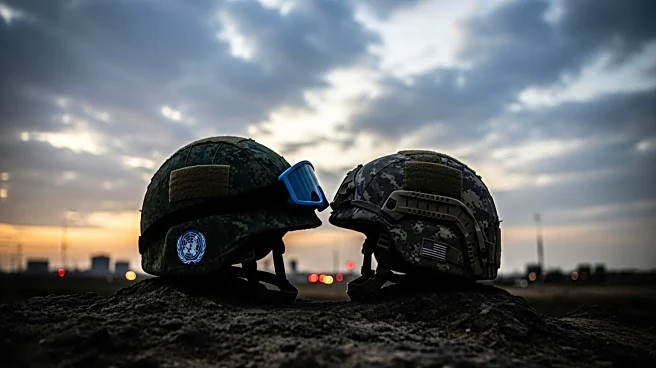What is the story about?
What's Happening?
On October 3, 1993, a mission by Task Force Ranger in Mogadishu, Somalia, intended as a brief raid, escalated into a prolonged battle after two Black Hawk helicopters were shot down. The operation aimed to disrupt a meeting of warlord Mohammed Farrah Aidid's commanders but quickly descended into chaos. U.S. forces, including Rangers and Delta operators, were split and under heavy fire, necessitating a rescue mission. The United Nations, with Malaysian armored vehicles and Pakistani tanks, alongside the U.S. Army's 10th Mountain Division, formed a relief column to extract the besieged soldiers. Despite facing intense resistance, the combined forces managed to reach the crash sites, rescue the wounded, and evacuate the area by dawn on October 4.
Why It's Important?
The rescue operation in Mogadishu is a significant event in military history, highlighting the importance of international cooperation in crisis situations. The involvement of UN forces, particularly from Malaysia and Pakistan, was crucial in the successful extraction of U.S. troops. This event underscores the complexities and dangers of urban warfare and the necessity of armored support in such operations. The mission's outcome had lasting impacts on U.S. military strategy and foreign policy, influencing future engagements and the perception of international peacekeeping efforts. The recognition of the contributions by Malaysian and Pakistani forces, often overshadowed in popular narratives, is essential for understanding the full scope of the operation.
What's Next?
The legacy of the Mogadishu operation continues to influence military training and international collaboration strategies. The event serves as a case study in military academies and has prompted discussions on the integration of international forces in U.S. military operations. Future military engagements may see increased emphasis on coalition building and the strategic use of armored units in urban environments. Additionally, the recognition of international contributions may lead to stronger diplomatic ties and cooperative defense agreements.
Beyond the Headlines
The Mogadishu rescue operation raises questions about the portrayal of military events in media and popular culture. The 2001 film 'Black Hawk Down' largely minimized the role of UN forces, which has been a point of contention. This highlights the broader issue of narrative control and the importance of acknowledging all contributors in historical accounts. The operation also reflects on the ethical considerations of military interventions and the responsibilities of international forces in conflict zones.















